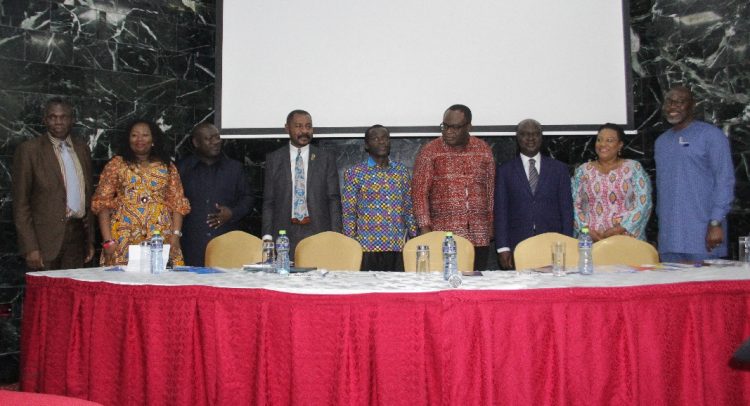The Minister of Planning, Professor George Gyan-Baffour (3rd right) in a group photograph with heads of the various agencies that put together the service charter
THE PRIVATE Enterprises Federation (PEF), a non-profit business institution, has collaborated with some state regulatory agencies to develop a new service delivery charter that will help eliminate undue delays and administrative corruption which adds up to cost of doing business.
The charter which sets out the standards of service is to among other things provide relevant information to clients on appropriate fees and due processes and procedures to go through when dealing with administering agencies.
The development of the charter was based on the outcome of research commissioned by PEF and STAR Ghana Foundation, a non-governmental organisation (NGO) which revealed that the service charters that guided the current operations of business administering agencies were outdated, thereby, leading to ineffectiveness due to delays associated with processing and issuing of mandatory documents like permits, licenses and certificates.
Launching the document in Accra, Thursday, Minister of Planning Prof. George Gyan-Baffour said the introduction of the service charter was in line with the President’s medium term goal of building functioning government machinery.
“This entails undertaking institutional reforms as well as strengthening the capacity of public sector institutions to deliver public goods and services efficiently,” he said.
The high level of collaboration between state agencies and private sectors to produce the charter, he indicated, emphasised government’s commitment to private sector development and participation of citizens in governance and national development.
He therefore urged all stakeholders to strictly adhere to the tenets of the charters in order to make the document relevant in serving as a reference for the services delivered to the public.
Programmes Director of Star Ghana Foundation, Ibrahim-Tanko Amidu, highlighted the devastating effect of corruption on the wellbeing of Ghanaian citizens where the poor and vulnerable, he said, were made to pay high prices to access better goods and services that they were ordinarily entitled to.
He also regarded corruption as an existential security threat that if not tackled urgently could destabilize the country due to the resentment it generated.
A charter consultant, Clara Kasser-Tee, emphasized among other things, the need for a periodic update of the charter, effective feedback mechanisms for clients to report and a focus on service delivery by administering agencies.
The launch of the document, she said, would also cure the ills of wasting time of clients, as it clearly spelt out the responsibility and functions of various administering agencies.
By Issah Mohammed and Nii Adjei Mensahfio


